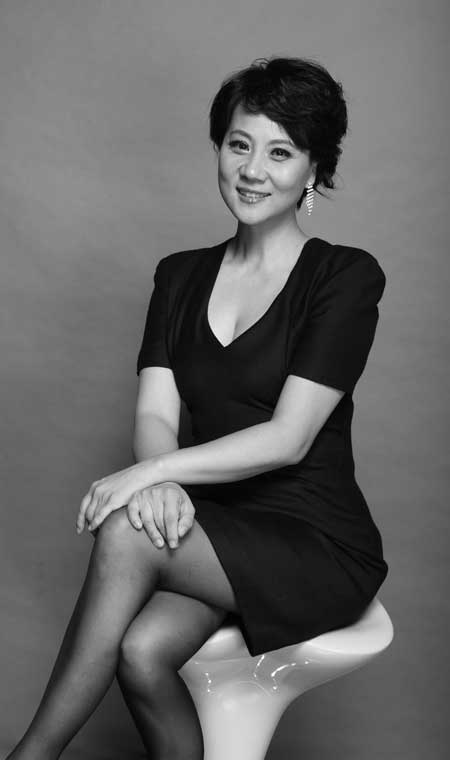Mamma Mia: Here we go again…
|
|
|
Tian Shui, who has been cast in the role of Donna. Photo: Courtesy of Zhang Yunfeng |
Four performers hoping for a part in the Chinese-language version of Mamma Mia recently learnt they have won a coveted role in the blockbuster musical.
Actress Tian Shui will play the lead role of Donna, while TV hostess Ding Dang and popular singer Shen Xiaocen will play Donna's two close friends, Rosie and Tanya. The role of Sophie went to 23-year-old Taiwanese Zhang Fangyu.
Penned by Catherine Johnson, with lyrics and music by 70s' supergroup ABBA, Mamma Mia is a light-hearted musical that has played in 240 cities worldwide since it first premiered 12 years ago. An English-language production was first staged in Shanghai in 2007.
Produced by United Asia Live Entertainment, the Chinese version will be the 13th foreign-language translation of this modern classic. And to select the ideal cast, producers held three rounds of auditions in Shanghai, Beijing and Guangzhou, attracting more than 2,000 applicants.
They have a dream
Tian Shui, who is a recipient of the Chinese Drama Plum Blossom Prize, says that she is confident of her experience and performing skills, but her biggest challenge will be the physicality of the role. With the prospect of performing up to 200 shows in six months, Tian has begun working out, as well as strengthening her vocal skills.
As Western-style musicals are still a relatively new art form in China, some industry professionals believe that there still exists a large gap in terms of experience and professional training between Chinese and Western performers.
But David Lightbody, the producer of the new Mamma Mia, told the Global Times there is no difference between casting a show in China and casting one anywhere else. "I think people are maybe being too pessimistic," he said. "We need to find triple-talented people – those who can sing, dance and perform well. This is hard anywhere in the world, not just in China."
Commentators are also concerned about the standards of professional musical education in China. Professor Jin Fuzai, the dean of the Department of Musicals at the Shanghai Conservatory of Music, told the Global Times that there are already many other performing arts in China such as opera, traditional Chinese opera and folk-style singing; a situation which leaves very little room for the development of musicals.
"We have no Chinese textbooks for these studies, not even any translated versions, which shows the paucity of our resources. Musicals are very different from piano or other instrumental performances, and language plays an important role in them," he said.
Thank you for the music
Professor Jin also questions whether there is a sufficient market for musicals in China, noting that the success of the genre in Japan is largely because of that country's closer ties with Western culture over many years.
Lightbody, however, is more optimistic, believing that the level of musical education in Shanghai is strong. Having dealt with students and teachers at the Shanghai Theater Academy and the Shanghai Conservatory of Music on many occasions, he insists that the point of China's musical education is not so much the training, but the opportunity to work. "More shows should be produced in Shanghai which, in turn, helps the industry develop and creates more job opportunities," he said.
He also believes that developing a market for musicals in China has to be done in three phases. And the Chinese production of Mamma Mia is a forerunner of the second phase.
The first phase is to introduce original classic musicals to China and cultivate more local musical lovers; the second phase involves adapting productions into Chinese-language versions in order to target a broader local audience; the third phase is making high-quality original Chinese musicals available to audiences.
Money, money, money
The show will debut on July 10 at the Shanghai Grand Theater with an average ticket price of around 350 yuan ($53), with the lowest price being 99 yuan. The first round of the tour will see performances in Shanghai, Beijing and Guangzhou over a period of six months. The production will subsequently tour second-tier cities and other Chinese-speaking countries such as Singapore and Malaysia.
The translation of the lyrics has been carried out by famous music writer Chen Lerong. This Wednesday, the producers will release clips of two musical numbers taken from the show ("Dancing Queen" and "The Winner Takes It All").
United Asia Live Entertainment?marketing manager Li Te also told the Global Times that the company has bought the rights to Cats and that a Chinese version is expected to be put on in May next year. The Chinese-language debut of history's most successful musical is expected to take place at the newly renovated Shanghai Cultural Square on Yongjia Road.
 0
0 








Go to Forum >>0 Comments